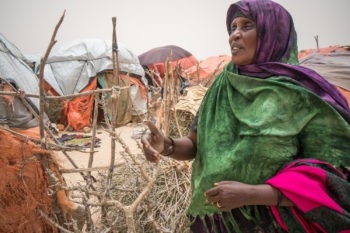Co-ordination is crucial to tackle Somalian drought crisis

From 2016-2017, Somalia encountered four consecutive poor rainy seasons which resulted in crop failure, high levels of livestock deaths and illness, and almost pushed the country to the verge of famine.
While 2018 has brought a better rain season, the adverse effects of severe drought remain, especially for poverty-stricken, displaced people and shepherds who lost their animals.
With the assistance from Diakonia Sweden, the Lutheran World Federation (LWF), Norwegian Church Aid (NCA) and Diakonie Katastrophenhilfe (DKH), Somalia avoided a famine.
Somalia needs to strengthen its emergency preparedness and disaster risk reduction strategies to decrease negative impact of drought and other climate related causes.
Norwegian Church Aid has given affected communities food access and life-saving WASH assistance including the construction of sanitary services, the distribution of water vouchers, and the rehabilitation of water services.
NCA also noted that local administrators play a significant role in identifying community needs and in project implementation. It is essential to promote engagement and participation with all local level stakeholders to ensure community support and awareness.
Over 128 million people worldwide are in need of protection and humanitarian assistance. It is crucial for humanitarian relief organisations to respond to the rising number of climate-induced humanitarian crises in adequate, cost-efficient ways.
Join us for the AIDF Africa Summit in Nairobi, Kenya on 26-27 February 2019
If you’d like to stay informed on the latest updates in aid and development, please sign up for the AIDF newsletter.
Photo Credit: ACT Alliance














